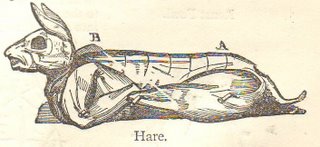 Today, September 5th …
Today, September 5th …There is an old conversational game in which players choose a historical figure that they would like invite along as a dinner guest. A variation of that game (freshly invented for today by TOF) is: What would a given historical figure chose from a given menu? The given menu today is the one shared by the luncheon guests at the Shakespeare Hotel, in Stratford-upon-Avon, upon this very day in 1934.
Clear Soup (hot or cold) Celery Soup.
Grilled Mackeral. Parsley Butter.
Scrambled egg with Tomatoes.
Roast Forequarters of Lamb. Mint Sauce.
Pork Chop.
Brussels Sprouts. Green Peas.
Boiled and Mashed Potatoes.
COLD BUFFET.
Curried Prawns.
Salami Mortadella Luncheon Sausage
Smoked Liver Sausage. Veal and Ham Pie.
Galantine of Chicken. Roast Ribs of Beef.
Roast Veal Steak and Kidney Pie.
Roast Chicken Roast Duckling Roast Lamb
Roast Pork
Ox Tongue York Ham Pressed Beef Salads
Apple and Blackberry Tart Rice Pudding
Fresh Pineapple and Cream. Vanilla Blanc-Mange
Cheese Biscuits Celery
ROAST GROUSE 5/6 ROAST PARTRIDGE 6/-
OYSTERS NATIVES 7/6 dozen
COLD, BOILED, OR GRILLED SALMON 2/6
MELON 2/-
The “New World” foods of tomato, potato, vanilla, and pineapple were “discovered” by the time he was born, and were known of (in theory at least) by English botanists and horticulturalists, but none were day-to-day items in his time. Will would not have recognised celery which was “newly arrived from Italy” in 1699, or brussels sprouts, which did not become a common dish in England until well into the nineteenth century.
All sausages are variations on a very, very old theme, so none of the varieties on offer would have been too strange (except perhaps Luncheon Sausage. What is “Luncheon Sausage” exactly?). Curried Prawns? The word was not in common use until the eighteenth century, but spicy seafood dishes were not rare at the time, so perhaps the dish would not have been too much of an edible shock to our guest.
Roasts, game birds, and oysters would have been very familiar, as would apple and blackberry tart, so I feel sure that these would have been his choices on the day.
If we were cooking for the Bard, it would be a different decision of course. It would seem polite to make something that he was familiar with, at least on his first visit, which brings us to our recipe for the day.
Recipe for the Day …
In The Taming of the Shrew, Act IV, Biondello says:
“I cannot tarry: I knew a wench married in an afternoon as she went to the garden for parsley to stuff a rabbit; and so may you, sir: and so, adieu, sir.”
It seems that rabbit stuffed with parsley would have been familiar to our guest, and luckily for us there is a fine recipe for rabbit stuffed with bread and “pleasant and wholesome hearbs” in a book published in 1588, just a few years before the play was first performed.
The book is by John Partridge, and goes by the grand title of “The widowes treasure plentifully furnished with sundry precious and approoued secretes in phisicke and chirurgery for the health and pleasure of mankinde : hereunto are adioyned, sundry pretie practises and conclusions of cookerie : with many profitable and holesome medicines for sundrie diseases in cattell.” It is a delightful mix of recipes and medicines for humans and animals – including an essential “medicine for to get the beetelwigges out of a mans eare” (the formula for which can be forwarded if required).
Without further ado, here is a pretty delicious sounding dish for dinner with Will.
To dresse a Hare or Cunny in brothe, with a pudding in their bellyes.
Your Hare or Cunnye being fleaed, and the Eares left on, let it be washed in two Waters, having before prepared in readinesse Grated Bread, Currans , sweet Mutton sewet, or Beefe sewet finely minced: with pleasant and wholesome hearbs, as Winter Saverye, and Peniryall, with sweete Margerome, these also verye finely chopped, and seasoned with pepper and Salte: Cloves and Mace, the yolkes of three Egges, with sweete Creame and Suger with two or three Dates, all these mingled together, put into the bellie of the Hare or Cunnye, and so sowe it up. Then take Mutton broth of the beste and fattest, put it in such a kettle where your Hare maye lye compasse or Cunnye long wayes, after it hath boyled a little put in, and put thereto Grapes or Gooseberries, sweete Butter, Salt, Verjuice, Currans, grated Bread and Suger, and when it is boyled, serve it forth with soppes.
Tomorrow’s Story …
Pemmican and Pudding.
Quotation for the Day …
“Give them great meals of beef and iron and steel, they will eat like wolves and fight like devils.” Henry V, III, 7
No comments:
Post a Comment